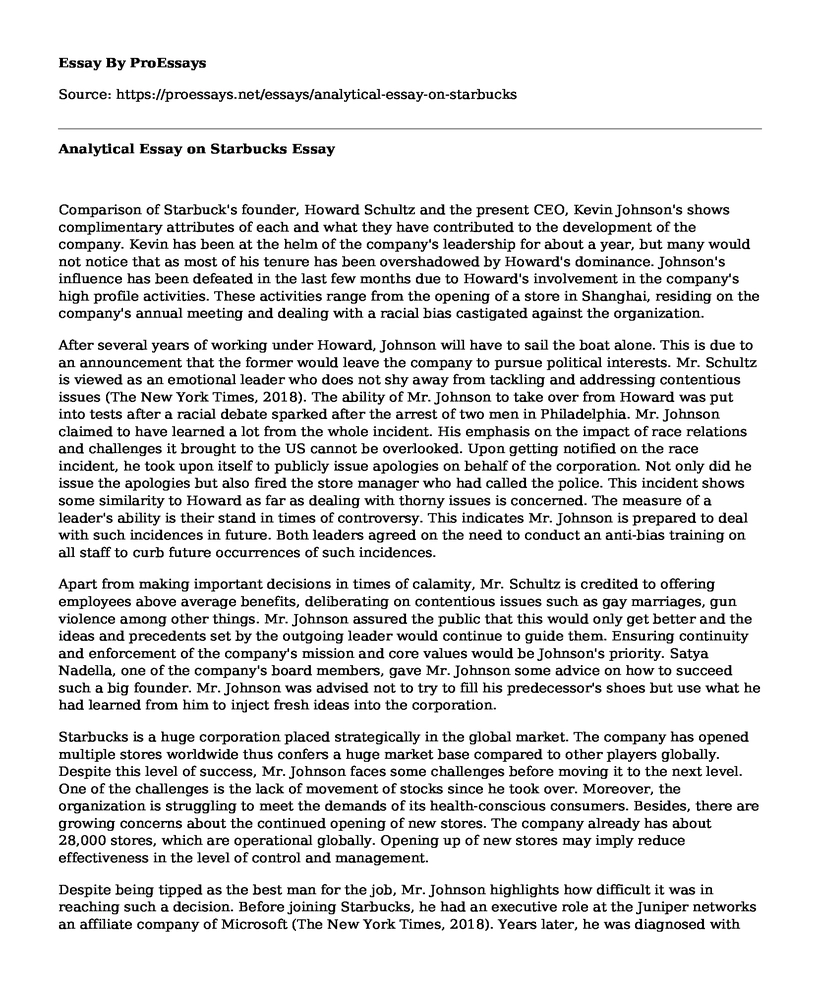Comparison of Starbuck's founder, Howard Schultz and the present CEO, Kevin Johnson's shows complimentary attributes of each and what they have contributed to the development of the company. Kevin has been at the helm of the company's leadership for about a year, but many would not notice that as most of his tenure has been overshadowed by Howard's dominance. Johnson's influence has been defeated in the last few months due to Howard's involvement in the company's high profile activities. These activities range from the opening of a store in Shanghai, residing on the company's annual meeting and dealing with a racial bias castigated against the organization.
After several years of working under Howard, Johnson will have to sail the boat alone. This is due to an announcement that the former would leave the company to pursue political interests. Mr. Schultz is viewed as an emotional leader who does not shy away from tackling and addressing contentious issues (The New York Times, 2018). The ability of Mr. Johnson to take over from Howard was put into tests after a racial debate sparked after the arrest of two men in Philadelphia. Mr. Johnson claimed to have learned a lot from the whole incident. His emphasis on the impact of race relations and challenges it brought to the US cannot be overlooked. Upon getting notified on the race incident, he took upon itself to publicly issue apologies on behalf of the corporation. Not only did he issue the apologies but also fired the store manager who had called the police. This incident shows some similarity to Howard as far as dealing with thorny issues is concerned. The measure of a leader's ability is their stand in times of controversy. This indicates Mr. Johnson is prepared to deal with such incidences in future. Both leaders agreed on the need to conduct an anti-bias training on all staff to curb future occurrences of such incidences.
Apart from making important decisions in times of calamity, Mr. Schultz is credited to offering employees above average benefits, deliberating on contentious issues such as gay marriages, gun violence among other things. Mr. Johnson assured the public that this would only get better and the ideas and precedents set by the outgoing leader would continue to guide them. Ensuring continuity and enforcement of the company's mission and core values would be Johnson's priority. Satya Nadella, one of the company's board members, gave Mr. Johnson some advice on how to succeed such a big founder. Mr. Johnson was advised not to try to fill his predecessor's shoes but use what he had learned from him to inject fresh ideas into the corporation.
Starbucks is a huge corporation placed strategically in the global market. The company has opened multiple stores worldwide thus confers a huge market base compared to other players globally. Despite this level of success, Mr. Johnson faces some challenges before moving it to the next level. One of the challenges is the lack of movement of stocks since he took over. Moreover, the organization is struggling to meet the demands of its health-conscious consumers. Besides, there are growing concerns about the continued opening of new stores. The company already has about 28,000 stores, which are operational globally. Opening up of new stores may imply reduce effectiveness in the level of control and management.
Despite being tipped as the best man for the job, Mr. Johnson highlights how difficult it was in reaching such a decision. Before joining Starbucks, he had an executive role at the Juniper networks an affiliate company of Microsoft (The New York Times, 2018). Years later, he was diagnosed with skin cancer, and he had to decide on whether to continue with work or take care of his health. He decided to retire from Juniper corporations to focus on his health and spend more time with family. However, he still holds a position in the Starbuck's board. After his health improved, he assumed the position of a chief operations officer in the company. His colleagues acknowledge his injection of new ideas into the company. Some of his ideas simplified operations in the organization and led to improved profitability. Mr. Johnson was involved in various activities that took the corporation to another level. These include acquiring full control of the Starbucks in China, the sale of Tazo tea brand to Unilever and the striking of a global distribution deal with Nestle. Rosalind Brewer, a chief operating officer in the corporation, brought out the complementary nature of the two by stipulating they get to the same place. The major contribution of Mr. Johnson is making Starbucks a more technologically adept corporation. This is through the initiation of mobile ordering and pickup program.
Reference
The New York Times (2018). The C.E.O. of Starbucks is not Leaving. Only Howard Schultz Is.
Cite this page
Analytical Essay on Starbucks. (2022, Nov 20). Retrieved from https://proessays.net/essays/analytical-essay-on-starbucks
If you are the original author of this essay and no longer wish to have it published on the ProEssays website, please click below to request its removal:
- Risks in the Banking Industry
- Essay Example on Management: Leadership Challenge in an Organization
- Organizations in Strategic Context - Paper Example
- Gender Discrimination at Workplaces Essay
- Critical Analysis of an Advertisement Campaign: A Case of Nike Inc
- Essay on Strategic Audit: Progress From Specialized Perception to Overall Organization
- Essay on Competing for Talent in a Tightening Market: Talent Management Strategies







